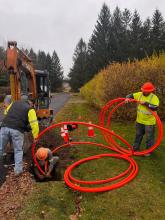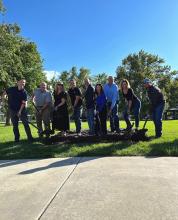By
on

John St. Julien covered this story last month, but I couldn't resist amplifying it. Cox Cable, which has undoubtedly told hundreds of communities that they don't need anything better than what it delivers over its cable network, has opted for a full FTTH in a wealthy new development in California's Orange County.
CED has the details, but the key point for us is yet another recognition that cable networks are yesterday's technology, unable to deliver the services that communities need today and will certainly need tomorrow.
Communities are smart to invest in their own fiber networks not only because the technology is superior, but because local, community ownership results in a more accountable network that will continue to meet community needs long into the future. Municipal electric networks have offered less expensive, more reliable services for over 100 years in some cases - a track record that reminds us how powerful this model can be.
Geoterm







